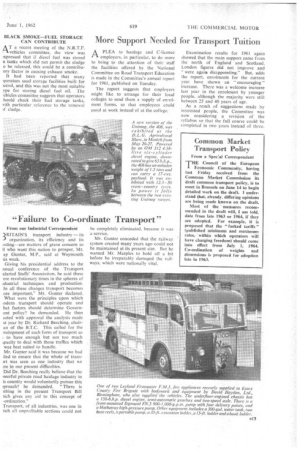"Failure to Co-ordinate Transport"
Page 47

If you've noticed an error in this article please click here to report it so we can fix it.
From our Industrial Correspondent
RITAIN'S transport industry — its organization, its efficiency and its asting—are matters of grave concern to ll who want this nation to prosper, Mr. ay Gunter, M.P., said at Weymouth us week.
Giving his presidential address to the nnual conference of the Transport alaried Staffs' Association, he said these ere revolutionary times in the spheres of idustrial techniques and production. In all these changes transport becomes ore important," Mr. Gunter declared. What were the principles upon which Lodem transport should operate and hat factors should determine GovernLent policy? he demanded. He then sated with approval the analysis made st year by Dr. Richard Beeching, chairan of the B.T.C. This called for the welopment of each form of transport so to have enough but not too much ipacity to deal with those traffics which was best suited to handle.
Mr. Gunter said it was because we had iled to ensure that the whole of transmt was seen as one industry that we me in our present difficulties.
Did Dr. Beeching really believe that the rwerful private road haulage industry in is country would voluntarily pursue this iproach? he demanded. "There is thing in the present Transport Bill nch gives any aid to this concept of -ordination."
Transport, of all industries, was one in lich all unprofitable sections could not
be completely eliminated, because it was a service.
Mr. Gunter conceded that the railway system created many years ago could not be maintained at its present size. But he warned Mr. Marples to hold off a bit before he irreparably damaged the railways, which were nationally vital.






































































































































































